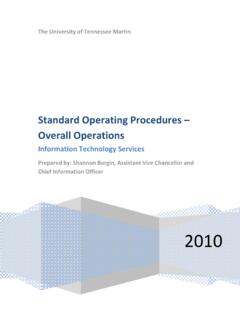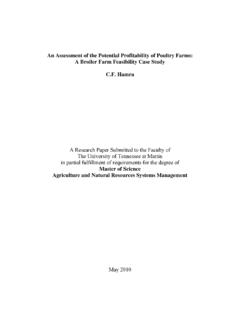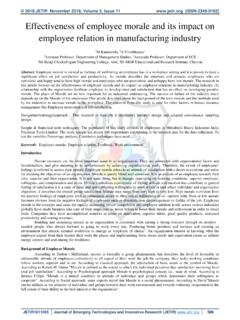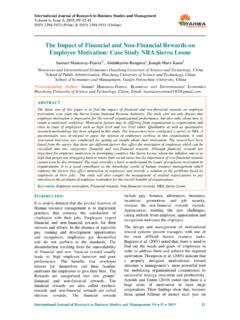Transcription of THE IMPORTANCE OF PAY IN EMPLOYEE MOTIVATION ...
1 It is easy to overestimate the frequencywith which adults actually go to the operaand underestimate the frequency withwhich they watch TV cartoons on Satur-day mornings, based on their self-reports.(Nunnally & Bernstein, 1994, p. 383)Rynes, Colbert, and Brown (2002) pre-sented the following statement to 959 mem-bers of the Society for Human ResourceManagement (SHRM): Surveys that di-rectly ask employees how important pay is tothem are likely to overestimate pay s true im-portance in actual decisions (p. 158). If ourinterpretation (and that of Rynes et al.) ofthe research literature is accurate, then thecorrect true-false answer to the above state-ment is false. In other words, people aremore likely to underreport than to overreportthe IMPORTANCE of pay as a motivational fac-tor in most situations.
2 Put another way, re-search suggests that pay is much more im-portant in people s actual choices andbehaviors than it is in their self-reports ofwhat motivates them, much like the cartoonviewers mentioned in the quote above. Yet,only 35% of the respondents in the Rynes etal. study answered in a way consistent withresearch findings ( , chose false ).Our objective in this article is to showthat EMPLOYEE surveys regarding the impor-tance of various factors in MOTIVATION gener-ally produce results that are inconsistentwith studies of actual EMPLOYEE behavior. Inparticular, we focus on well-documentedfindings that employees tend to say that payTHE IMPORTANCE OF PAY IN EMPLOYEEMOTIVATION: DISCREPANCIES BETWEENWHAT PEOPLE SAY AND WHAT THEY DOHuman Resource Management,Winter 2004, Vol.
3 43, No. 4, Pp. 381 394 2004 Wiley Periodicals, Inc. Published online in Wiley InterScience ( ).DOI: L. Rynes, Barry Gerhart, and Kathleen A. MinetteA majority of human resources professionals appear to believe that employees are likely to over-report the IMPORTANCE of pay in EMPLOYEE surveys. However, research suggests the opposite is ac-tually true. We review evidence showing the discrepancies between what people say and do withrespect to pay. We then discuss why pay is likely to be such an important general motivator, aswell as a variety of reasons why managers might underestimate its IMPORTANCE . We note that payis not equally important in all situations or to all individuals, and identify circumstances underwhich pay is likely to be more (or less) important to employees. We close with recommendationsfor implementing research findings with respect to pay and suggestions for evaluating pay sys-tems.
4 2004 Wiley Periodicals, to: Sara L. Rynes, Tippie College of Business, 108 PBB, University of Iowa, Iowa City, IA52242-1000, tel. 319-335-0838, HUMANRESOURCEMANAGEMENT, Winter 2004is less important to them than it actually is an important point because if em-ployees reports are taken at face value, HRprofessionals are likely to seriously underes-timate the motivational potential of , a quick survey of the journals ormagazines that are most often read by prac-titioners (in particular, HR Magazine for HRprofessionals and Harvard Business Reviewfor general managers) suggests that they, too,tend to take EMPLOYEE surveys at face valuewithout carefully examining the behavioralevidence related to pay and the section that follows, we first pres-ent evidence demonstrating the gap betweenwhat people say and what they do with re-spect to pay.
5 We then show that practitionerjournals present claims about pay importancethat are inconsistent with research about theactual motivational effects of pay. In general,there appears to be a consistent (but incor-rect) message to practitioners that pay is nota very effective motivator a message that, ifbelieved, could cause practitioners to seri-ously underestimate the motivational poten-tial of a well-designed compensation between What People Say and Dowith Respect to PayTable I presents findings from a number ofmajor studies that have attempted to deter-mine the IMPORTANCE of pay to employees,relative to other potential motivators. In thefirst column are the results of studies thathave simply asked people to rate or rankpay s IMPORTANCE , relative to other potentialmotivators. In the right-hand column arethe results of studies in real, ongoing or-ganizations that examine differences inwork output following implementation ofvarious motivational interventions: modifi-cations of pay systems, work redesign, in-creases in EMPLOYEE participation, and en-hanced performance feedback.
6 In order toincrease the reliability of the conclusionsdrawn, we included only studies that are ei-ther narrative reviews of the literature,meta-analytic reviews (which incorporatethe data from many individual studies into asingle large-scale empirical analysis),1orsingle studies with very large sample sizes( , Jurgensen [1978], which had over50,000 respondents, and Towers Perrin[2003], which had over 35,000].As the first column of Table I shows,when asked directly about the IMPORTANCE ofpay, people tend to give it answers that placesomewhere around fifth (range = second toeighth) in lists of potential motivators. Incontrast, meta-analytic studies of actual be-haviors in response to motivational initiatives(second column) nearly always show pay tobe the most effective motivator.)
7 Indeed, afterconducting the first such meta-analysis withrespect to motivational interventions, Locke,Feren, McCaleb, Shaw, and Denny (1980)concluded: Money is the crucial incentive .. no other incentive or motivational tech-nique comes even close to money with re-spect to its instrumental value (p. 379).Subsequent research has continued to sup-port their do such discrepancies occur, andhow can psychological theories help us ex-plain them? The common tendency for peo-ple to say one thing but do another is knownas socially desirable responding: the tendencyto choose items that reflect societally ap-proved behaviors (Nunnally & Bernstein,1994, p. 382). Social desirability stems fromeither a lack of self-insight or a lack of frank-ness (Nunnally & Bernstein, 1994).
8 In thecase of pay, people are likely to understate im-portance either because they misjudge howthey might react to, say, an offer of a higher-paying job, or due to social norms that viewmoney as a less noble source of motivationthan factors such as challenging work or workthat makes a contribution to speaking, the more a particu-lar question touches on strongly held socialvalues, the less valid direct self-reports arelikely to be. In such cases, both managersand researchers must find additional ways offerreting out more valid information. Recog-nizing this, some researchers have ap-proached the topic of pay IMPORTANCE by ex-amining how employees behaviors(such asturnover or performance) change in re-sponse to changes in pay and other HR prac-tices ( , the second column in Table I).
9 These behavioral responses are far morecompelling pieces of evidence than people sIn general,there appears tobe a consistent(but incorrect)message topractitionersthat pay is nota very effectivemotivator amessage that, ifbelieved, couldcausepractitioners toseriouslyunderestimatethemotivationalp otential of IMPORTANCE of Pay in EMPLOYEE MOTIVATION 383responses to surveys regarding what is im-portant to them. As Table I shows, on aver-age, employees respond more effectively tomonetary incentives than to any other moti-vational HR presence of socially desirable re-sponding has been revealed using a numberof other research techniques as well. For ex-ample, one common psychological researchstrategy is to adopt projective techniques( , asking what people think othersproba-bly think or do, or asking them to create amotivational story from an ambiguous pic-ture) to draw out sensitive or threatening in-formation.
10 A creative example of this ap-proach was implemented by Jurgensen(1978), who assessed the relative importanceof ten job characteristics (including pay) to50,000 job applicants over a 30-year periodby asking them to decide which of the fol-lowing [job attributes] is most important toyou (p. 268). Based on these direct re-sponses, males reported pay to be only thefifth most important factor, while women re-ported it to be even lower (seventh; see TableI). However, when Jurgensen asked the samemen and women to rank the IMPORTANCE ofthe same ten attributes to someone just likeDiscrepancies between Self-Reports of Pay IMPORTANCE and Behavioral Responses to Changes in PayMajor Studies of Behavioral Responses to Pay and Other Major Studies of Self-Reported Pay ImportanceMotivational Interventions1.













